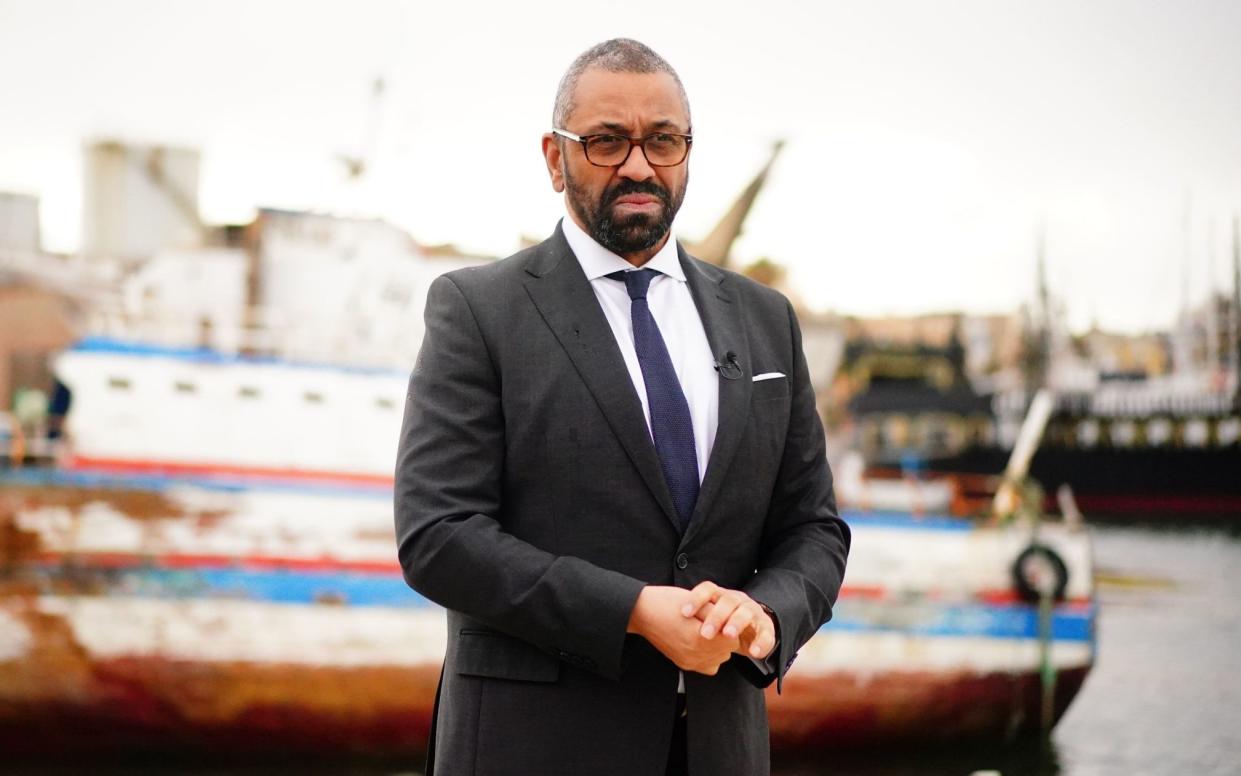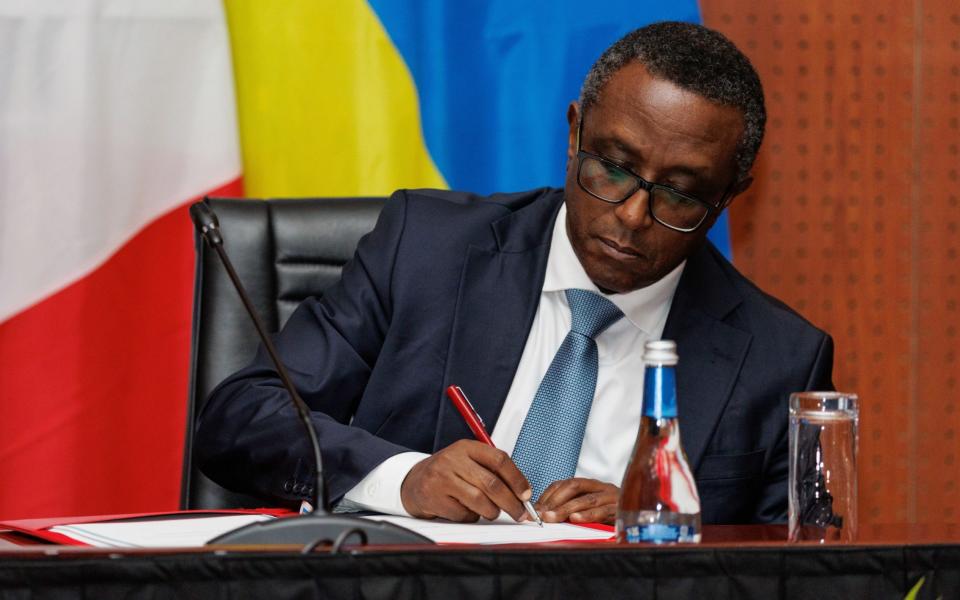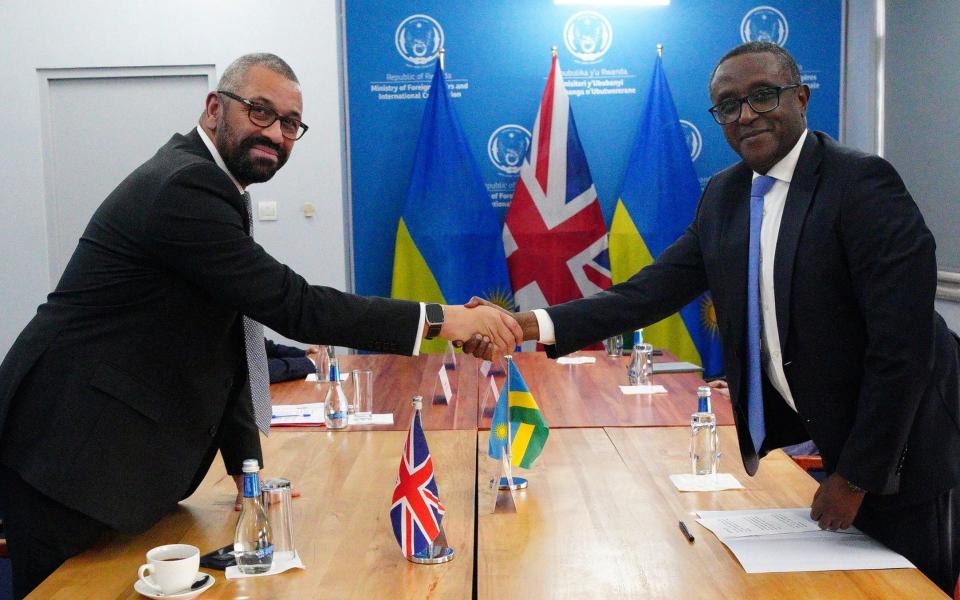Rwanda critics ‘wilfully ignore’ progress made by African state, says Cleverly

James Cleverly has accused critics of Rwanda of “wilfully ignoring” the progress that the country has made in the last 30 years.
In what will be seen as a fresh rebuke to Emmanuel Macron, the Home Secretary hit back at those who see Rwanda as unsafe for asylum seekers or an unequal partner in tackling the international illegal migration crisis.
He was speaking after a two-day trip to Italy where he visited the island of Lampedusa, which has received hundreds of thousands of refugees and migrants who cross in boats from the coast of North Africa and a day after Rishi Sunak rebuked the French president for his criticism of the Rwanda policy as a “betrayal of values”.
In a speech on Thursday, Mr Macron suggested that using African third countries for asylum processing would create a “geopolitics of cynicism” and “new dependencies”.
He claimed the policy would prove “totally ineffective”.
However, Mr Cleverly, in a joint article with Rwanda’s foreign minister Vincent Biruta, said the Rwanda scheme was “precisely the kind of international collaborative effort” that was needed to tackle illegal migration.
“Critics have wilfully ignored the immense progress Rwanda has made over the last 30 years,” he said.
“No country is perfect, but Rwanda is safe, fair and accommodating.
“It has worked energetically to provide opportunities for its citizens and it collaborates constructively with its international partners.
“The UK and Rwanda have worked in lockstep to bring about a safe and effective scheme for the relocation of illegal migrants.
“Ours is a partnership both governments can be proud of because it benefits the people of both countries.”

His comments follow the passing of the Safety of Rwanda Act, which gained royal assent on Thursday, paving the way for the first deportation flights.
Mr Sunak said this week he aimed to get the first removals off the ground within 10 to 12 weeks.
Speaking to the parliamentary press gallery, Mr Cleverly also described “lazy criticism” of Rwanda based on old thinking as “distasteful”.
He said these critics saw African countries exclusively through the prism of “aid recipients” rather than countries with which the UK could have “grown-up” commercial relationships.
“What message is that sending to developing countries to go, ‘We’re not going to have a relationship with equals where we are transacting, where we are helping solve each other’s problems. No, no, no, no, no, no, know your place, little African country. Here’s a bit of aid money, now shut up and get with the programme’.
“I don’t buy that. And I find it really distasteful some of the lazy criticism that has come for Rwanda.
“If we don’t reward countries like Rwanda for doing the right thing, and being forward thinking and being positive, and seeking to provide solutions rather than problems, what’s the point?”

Meanwhile, Downing Street said it was too early to jump to conclusions about the deterrent impact of the Rwanda scheme after the Irish government suggested it was causing an increase in migrants crossing from Northern Ireland.
Micheál Martin, the Irish deputy prime minister, had said the policy was already impacting Ireland as people were “fearful” of staying in the UK and crossing the border to the Republic so they would not be sent to Rwanda.
But a No 10 spokesman said: “It is too early to jump to specific conclusions about the impact of the Act and treaty in terms of migrant behaviour.
“Of course, we will monitor this very closely and we already work very closely as you would expect with the Irish government, including on matters relating to asylum.
“But, of course, the intention behind the Act is to have it serve as a deterrent and that is why we are working to get flights off the ground as swiftly as possible.”
Our partnership is needed to tackle people smuggling
By James Cleverly and Vincent Biruta
Illegal migration and people smuggling is a global challenge. It necessitates international cooperation and coordination. Our landmark partnership is precisely the kind of international collaborative effort that is required.
Thirty years after the genocide against the Tutsi, Rwanda has transformed into a peaceful country, with growing prosperity, where everyone is treated with the same dignity and respect.
Critics have wilfully ignored the immense progress Rwanda has made over the last 30 years.
No country is perfect, but Rwanda is safe, fair and accommodating.
It has worked energetically to provide opportunities for its citizens and it collaborates constructively with its international partners.
The UK and Rwanda have worked in lockstep to bring about a safe and effective scheme for the relocation of illegal migrants.
Ours is a partnership both governments can be proud of because it benefits the people of both countries.
This week, the Safety of Rwanda Act finally passed through the UK Parliament. It confirms Rwanda’s justified status as a safe country.
This is a fact that Rwandans, and those who have travelled to the country, have always known to be true.

Our landmark treaty, which ensures the safe relocation of migrants to Rwanda, has now been ratified by both Rwanda and the UK.
The Act and treaty together are a significant step forward to address the broken global migration system’s failures and dismantle the people smugglers’ business model once and for all.
Rwanda and the UK share high standards with regard to the protection of asylum seekers and refugees. Our treaty sets out joint commitments to upholding international law.
These commitments satisfy the concerns of the UK Supreme Court and will set this bold, innovative scheme in motion.
Throughout this complicated process, both the Rwandan and UK governments have worked closely and carefully, paying intense attention to the smallest details while extending consideration to the breadth of possible challenges.
In order to pull off the seismic reform that this partnership will deliver, we have worked tirelessly and in a constant spirit of collaboration.
The treaty re-emphasises, in a binding manner, already existing commitments that address concerns raised in the legal process about the protection of asylum seekers.
The treaty ensures they will be safe and fully supported for five years and will have their asylum claims processed fairly.
It means those who are not granted refugee status or humanitarian protection will get equivalent treatment and will be granted permanent residence.
This is a fair and compassionate way of resolving the persistent problem of illegal migration, putting people first whilst acting as a systemic deterrent.
We know that the threat of relocation works as an effective deterrent. As a result of the tough measures the UK Government has already introduced, there has been a significant decrease in Channel crossings.
The UK saw 16,000 fewer small boats arrive last year compared to 2022 and the UK’s deal with Albania has led to a 90 per cent decline in Albanians attempting to enter the UK illegally.
This is a testament to the hard work of dedicated Border Force officers and reveals the value of working collaboratively and creatively with international partners.
Beyond being a deterrent, a fundamental part of the partnership is its commitment to economic development.
This is an acknowledgement of the root causes of migration, which need to be addressed.
Among other things, developed nations should invest in the regions producing these migrants, sustainably tackling the global inequalities of opportunity that drive migrants from their homes.
This is why it is right that the UK provides funds to support Rwanda’s economic development.
Creating more opportunities will deter people from making perilous journeys to Europe.
Both the UK and the Rwandan government are ready to relay and receive migrants and robust operational plans are in place to ensure a first flight can take off in the next 10-12 weeks.
Our two countries enjoy an excellent relationship, and we are making sure that it is a mutually beneficial one.
Measures like our migration and economic development partnership will set our respective countries on a new course.
James Cleverly is the UK Home Secretary. Dr Vincent Biruta is Rwanda’s minister of foreign affairs and international cooperation


